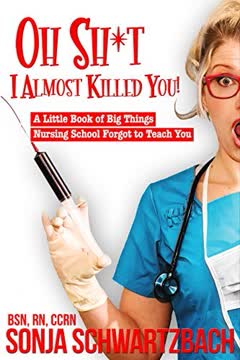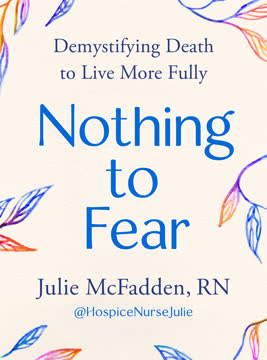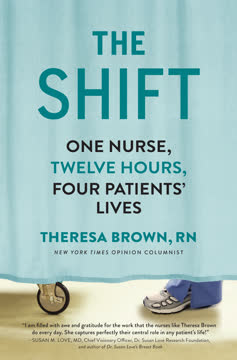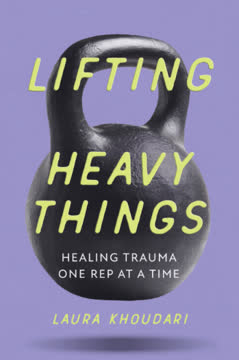Key Takeaways
1. Nursing School Doesn't Teach Everything: Embrace the "Oh Shit!" Moments
It’s the craziest thing to enter into a profession where the education and clinical components leave you barely prepared enough to place a urinary catheter into a mannequin with almost-sterile technique, yet expects you to walk into the doors of a hospital, guns blazing, ready to take on the complexities of a healthcare system.
Bridging the gap. Nursing school provides a foundation, but the real learning begins on the job. New nurses often feel overwhelmed by the gap between textbook knowledge and the realities of patient care. It's crucial to accept that feeling clueless is normal and to embrace the learning process.
Real-world scenarios. The book emphasizes that nursing school can't prepare you for every situation. From managing multiple patients with complex needs to dealing with difficult family members, the challenges of nursing are often unpredictable. The author shares personal anecdotes of feeling unprepared and relying on experienced colleagues for guidance.
Continuous learning. The key is to be open to learning from every experience, both good and bad. New nurses should seek out mentors, ask questions, and actively seek opportunities to expand their knowledge and skills. The "Oh Shit!" moments are inevitable, but they are also valuable learning opportunities.
2. Finding Your First Nursing Job: Networking and Realistic Expectations
The reality is this: if you have plans to graduate from a nursing program; walk into a hospital as a novice nurse; and be hired immediately into the intensive care unit, labor and delivery, the emergency department, or another “hot ticket” hospital unit – I respectfully advise you to think again.
Experience matters. Landing a dream job straight out of nursing school is rare. Hospitals often prefer candidates with prior experience, even if it's not in an acute care setting. Any experience is better than none at all.
Gaining an edge. The book suggests several ways to gain experience and improve your chances of getting hired:
- Working as a patient care technician or nursing assistant
- Volunteering in a hospital or clinic
- Participating in internships or externships
- Networking with nurses and healthcare professionals
Realistic expectations. It's important to be open to different opportunities and not get discouraged if you don't land your ideal job right away. Starting in a less competitive unit or facility can provide valuable experience and pave the way for future advancement.
3. Nailing the Nursing Interview: Authenticity and Preparation
The long and short of it is this: be yourself. Your self is good enough.
Be genuine. Authenticity is key to a successful nursing interview. Hiring managers can spot insincerity, so it's important to be honest about your skills and experiences. Highlight your strengths, but also acknowledge your weaknesses and demonstrate a willingness to learn.
Preparation is key. Research the hospital's mission, values, and services. Familiarize yourself with current nursing practices and quality indicators. Be prepared to answer common interview questions, such as "Tell me about yourself" and "Why do you want to work here?"
Transferable skills. Don't underestimate the value of your past experiences, even if they're not directly related to nursing. Skills like communication, teamwork, and problem-solving are highly valued in the nursing profession. Frame your experiences in a way that highlights these skills.
4. Surviving the First Year: Persistence and Self-Care
Nursing is sink or swim. Nursing is a whirlwind. Nursing will make you feel like the stupidest and most incompetent professional on the planet, and it’s going to ask that you show up the next day and do it all over again.
Expert to novice syndrome. The first year of nursing is a steep learning curve. New nurses often experience a period of self-doubt and feel overwhelmed by the responsibilities of the job. It's important to remember that this is a normal part of the transition from student to professional.
Seeking support. The book emphasizes the importance of having a strong support system during the first year. Connect with experienced nurses, attend support groups, or seek counseling if needed. Don't be afraid to ask for help and share your struggles with others.
Prioritizing self-care. Nursing is a demanding profession, and it's easy to burn out. Make time for self-care activities, such as exercise, relaxation, and hobbies. Set boundaries and learn to say no to extra shifts or responsibilities. Remember, you can't pour from an empty cup.
5. Navigating the Healthcare Hierarchy: Respect and Assertiveness
Our Short-Coat colleagues generally make a concerted effort to leave a good impression on the nursing staff, and while they want to learn all they can, there are limitations to their practice for practice.
Teamwork is essential. The healthcare system is a complex web of professionals, and nurses play a crucial role in coordinating patient care. It's important to treat all members of the team with respect, regardless of their position or experience.
Advocating for patients. Nurses are patient advocates, and they must be willing to speak up if they have concerns about a patient's care. This may involve questioning a doctor's order or challenging a policy that is not in the patient's best interest.
Communication is key. Effective communication is essential for navigating the healthcare hierarchy. Learn how to communicate your concerns clearly and respectfully, and be open to feedback from others. Remember, the goal is to work together to provide the best possible care for your patients.
6. The Emotional Toll of Nursing: Acknowledge, Express, and Seek Support
Every nurse remembers his or her first patient death.
Witnessing suffering. Nursing involves witnessing human suffering on a daily basis. It's important to acknowledge the emotional toll of this work and find healthy ways to cope.
Expressing emotions. The book encourages nurses to express their emotions, whether it's through crying, talking to a friend, or writing in a journal. Suppressing emotions can lead to burnout and other mental health problems.
Seeking professional help. If you're struggling to cope with the emotional demands of nursing, don't hesitate to seek professional help. Therapists and counselors can provide support and guidance. Remember, taking care of your mental health is just as important as taking care of your physical health.
7. The Importance of Humor and Levity: Finding Joy in the Chaos
For nurses across the spectrum, laughter isn’t the best medicine: Ativan is. Laughter, though, that holds a solid number two spot.
Coping mechanism. Humor can be a powerful coping mechanism for nurses. It can help to relieve stress, build camaraderie, and find joy in the midst of chaos.
Dark humor. The book acknowledges that nursing humor can sometimes be dark or inappropriate. However, it emphasizes that this type of humor is often a way for nurses to process difficult emotions and experiences.
Finding the balance. It's important to find a balance between humor and professionalism. Be mindful of your audience and avoid making jokes that could be offensive or hurtful to patients or colleagues.
8. Social Media and Professionalism: Think Before You Post
All it takes is one bonehead public post or picture to jeopardize your nursing career and even your professional license.
Protecting patient privacy. Social media can be a valuable tool for connecting with other nurses and sharing information. However, it's crucial to protect patient privacy and avoid posting anything that could violate HIPAA.
Maintaining professionalism. Remember that your online presence reflects on your professional reputation. Avoid posting anything that could be considered unprofessional, such as offensive comments, inappropriate photos, or confidential information.
Employer policies. Be aware of your employer's social media policies and adhere to them. Some hospitals have strict rules about what employees can post online.
9. Advanced Practice or Bedside: Choosing Your Nursing Path
As my journey toward academic advancement continues to evolve, I want to remind you that an advanced practice degree is not the end-all, be-all of the nursing profession.
Multiple paths. Nursing offers a variety of career paths, from bedside care to advanced practice to administration. It's important to choose a path that aligns with your interests, skills, and goals.
Advanced practice considerations. If you're considering an advanced practice degree, research the different options and talk to nurses in those roles. Consider the time commitment, financial investment, and scope of practice.
Bedside nursing value. Don't underestimate the value of bedside nursing. It's a challenging and rewarding career that allows you to make a direct impact on patients' lives. There is no shame in remaining at the bedside.
10. The Future of Nursing: Embrace Change and Advocate for Improvement
The future of nursing depends on you. What you bring into this profession will dictate whether others choose to remain a part of it, or damn the field to hell.
Evolving profession. Nursing is a constantly evolving profession. New technologies, treatments, and models of care are always emerging. It's important to be open to change and willing to adapt.
Advocating for change. Nurses have a responsibility to advocate for improvements in the healthcare system. This may involve speaking out against unsafe practices, supporting legislation that benefits patients, or promoting evidence-based care.
Mentoring the next generation. Experienced nurses should mentor new nurses and help them develop the skills and knowledge they need to succeed. By supporting the next generation of nurses, we can ensure that the profession continues to thrive.
Last updated:
FAQ
1. What is "Oh Sh*t, I Almost Killed You!" by Sonja Schwartzbach about?
- Honest look at nursing: The book is a candid, humorous, and practical guide for new nurses, focusing on the real-life challenges and emotional rollercoaster of starting a nursing career.
- What school didn’t teach: It highlights the gaps between nursing school education and the realities of bedside nursing, sharing lessons, mistakes, and survival tips.
- Personal stories and advice: Sonja Schwartzbach uses her own journey from corporate worker to ICU nurse to illustrate the struggles, growth, and triumphs of new nurses.
- Emotional and practical support: The book offers both emotional encouragement and actionable advice for surviving and thriving in the first years of nursing.
2. Why should I read "Oh Sh*t, I Almost Killed You!" by Sonja Schwartzbach?
- Real-world preparation: It prepares new nurses for the realities of the job that textbooks and classrooms often overlook.
- Relatable and supportive: The author’s voice is empathetic, funny, and honest, making readers feel less alone in their struggles.
- Practical tips and wisdom: The book is packed with actionable advice, from job hunting to handling difficult colleagues and patients.
- Emotional resilience: It addresses the emotional toll of nursing and offers strategies for coping, self-care, and maintaining passion for the profession.
3. What are the key takeaways from "Oh Sh*t, I Almost Killed You!" by Sonja Schwartzbach?
- Nursing is tough but rewarding: The profession is filled with challenges, mistakes, and emotional highs and lows, but it’s also deeply meaningful.
- Survival requires support: Building a support system, seeking mentorship, and learning from experienced nurses are crucial for new nurses.
- Self-care is essential: Nurses must prioritize their own well-being to avoid burnout and provide the best care for patients.
- Embrace imperfection and growth: Mistakes are inevitable, but honesty, accountability, and a willingness to learn are what make a great nurse.
4. What are the "Ten New Nurse Commandments" in "Oh Sh*t, I Almost Killed You!" and what do they mean?
- Self-care basics: Drink coffee, pee during your shift, and relax after work—basic survival for nurses.
- Documentation is vital: If you didn’t document it, it didn’t happen; thorough charting protects your license.
- Medication safety: Honor the six rights of medication administration to prevent errors.
- Teamwork and respect: Treat colleagues as you wish to be treated, even when tensions run high.
- Infection control and patient care: Wash hands, scrub hubs, and always prioritize patient safety and dignity.
5. How does Sonja Schwartzbach describe the transition from nursing school to real-world nursing in "Oh Sh*t, I Almost Killed You!"?
- Sink or swim reality: New nurses often feel unprepared and overwhelmed, as real-life nursing is far more complex than school scenarios.
- Short orientation periods: Many new nurses receive minimal on-the-job training, making the first months especially challenging.
- Emotional rollercoaster: Expect to feel scared, incompetent, and even want to quit, but these feelings are normal and temporary.
- Growth through experience: Over time, new nurses gain confidence, learn to prioritize, and develop the ability to handle crises.
6. What practical job-hunting and interview advice does "Oh Sh*t, I Almost Killed You!" offer new nurses?
- Get experience early: Work as a patient care technician, volunteer, or seek internships before graduation to improve job prospects.
- Network and hustle: Connections and hands-on experience often matter more than grades or resumes in landing a first job.
- Be authentic in interviews: Present your true self, highlight transferable skills, and avoid exaggerating your abilities.
- Prepare and follow up: Research the hospital, practice interview questions, and always send a thank-you note after interviews.
7. How does "Oh Sh*t, I Almost Killed You!" by Sonja Schwartzbach address mistakes and the fear of harming patients?
- Mistakes are inevitable: Every nurse will make errors, from minor slip-ups to more serious incidents, especially early in their career.
- Own up immediately: Honesty and prompt reporting are essential for patient safety and professional integrity.
- Learn and move forward: Use mistakes as learning opportunities rather than sources of shame or fear.
- Emotional impact: The fear of harming a patient is real and can be paralyzing, but support and time help nurses move past it.
8. What does Sonja Schwartzbach say about nurse culture, bullying, and teamwork in "Oh Sh*t, I Almost Killed You!"?
- "Nurses eat their young": The book discusses the unfortunate tradition of senior nurses being tough on newcomers, likening it to hazing.
- Stand up for yourself: New nurses are encouraged to assert themselves respectfully and not accept bullying as normal.
- Value every team member: Respect for all roles—nursing assistants, therapists, physicians—is emphasized as key to good patient care.
- Seek mentorship: Experienced nurses ("the OGs") are invaluable resources for learning and support.
9. How does "Oh Sh*t, I Almost Killed You!" by Sonja Schwartzbach address the emotional challenges and self-care needs of nurses?
- Emotional highs and lows: Nurses experience intense emotions, from grief over patient deaths to joy in making a difference.
- Laughter as medicine: Humor is a vital coping mechanism for dealing with stress and difficult situations.
- Crying is normal: It’s okay to feel and express sadness, frustration, or exhaustion—bottling it up is unhealthy.
- Find healthy outlets: Whether it’s socializing, hobbies, or therapy, nurses must find ways to decompress and separate work from personal life.
10. What are some of the most important skills and habits for new nurses according to "Oh Sh*t, I Almost Killed You!"?
- Thorough assessments: Always perform your own head-to-toe assessment and never rely solely on handoff reports.
- Documentation discipline: Chart accurately, concisely, and consistently to protect yourself legally and ensure continuity of care.
- Infection control vigilance: Hand hygiene, scrubbing hubs, and maintaining a clean environment are non-negotiable.
- Professional boundaries: Maintain patient dignity, respect privacy, and use social media wisely to avoid career-jeopardizing mistakes.
11. How does "Oh Sh*t, I Almost Killed You!" by Sonja Schwartzbach discuss career growth, advanced practice, and leaving bedside nursing?
- Many career paths: Nursing offers diverse opportunities, from bedside care to advanced practice, management, education, and beyond.
- No shame in change: It’s okay to leave bedside nursing if it’s not the right fit; self-awareness and happiness matter.
- Consider costs and benefits: Advanced degrees can be rewarding but require significant investment and may not always lead to higher pay.
- Follow your passion: Choose career moves based on personal fulfillment, not just external expectations or financial incentives.
12. What are the best quotes from "Oh Sh*t, I Almost Killed You!" by Sonja Schwartzbach and what do they mean?
- “If you didn’t document it, you didn’t do it!”: Emphasizes the legal and professional importance of thorough documentation.
- “Nursing is sink or swim.”: Captures the overwhelming feeling of being thrown into real-world practice with little preparation.
- “You will carry immense responsibility and very little authority.”: Highlights the paradox of nursing—huge accountability with limited power.
- “You can never not be a nurse.”: Reflects how nursing becomes an integral part of one’s identity, affecting all aspects of life.
- “Be a nurse that is better than what has been done to you.”: Encourages breaking the cycle of bullying and negativity in the profession.
Review Summary
"Oh Sh*t, I Almost Killed You!" receives mixed reviews, with an average rating of 3.73 out of 5. Readers appreciate the book's humor, relatability, and insights into nursing challenges. Many find it encouraging for new nurses, praising its candid approach and personal anecdotes. However, some criticize its repetitiveness, lack of substantive advice, and numerous grammatical errors. While some readers feel it reignites their passion for nursing, others find it lacks depth and fails to deliver on its promising title.
Similar Books
Download PDF
Download EPUB
.epub digital book format is ideal for reading ebooks on phones, tablets, and e-readers.








